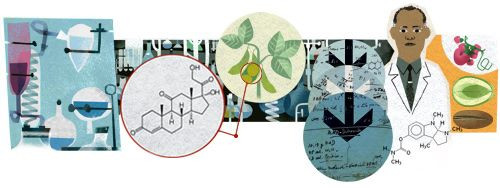Google Doodle: Chemist Percy Lavon Julian Overcame Segregation And Became A Medical Pioneer

On Friday, the Google Doodle honors Percy Lavon Julian — a pioneer in drugs such as cortisone, steroids, and birth control pills — on what would have been his 115th birthday. The chemist is memorable in history beyond his medical discoveries, as he also overcame obstacles of segregation along the way.
Julian was the grandson of former slaves in Montgomery, Ala., in 1899. Adversity was something that Julian knew all too well. When he finished up the eighth grade, there were no high schools open to black students. He applied to DePauw University in Greencastle, Ind., and was admitted, but he needed to take high school evening classes so that he met the same academic level as his peers. In 1922, Julian accepted a scholarship to attend Harvard University to complete his master’s degree but was not allowed to pursue a doctorate. In 1931, Julian eventually received a Ph.D. at the University of Vienna in Austria.
He is most famous for synthesizing testosterone and estrogen from soybean oil, and for also creating a synthetic substitute for cortisone, which helped the treatment of rheumatoid arthritis. Despite his successes in science, Julian was often denied many opportunities, especially with larger careers. He received 19 honorary doctorates and held more than 100 patents.
The successful chemist later established his own company, Julian Laboratories, where he produced synthesized cortisone. While in Mexico, he discovered that wild yams were even better than soy beans for the production of his "substance S" for the manufacturing of synthetic cortisone. Julian also used soy products during World War II to produce Aerofoam, which helped put out gasoline and oil fires.
During his trials and successes, Julian met his wife, Anna Roselle Johnson-Julian, while working at Howard University. They married in 1935 and had two children, Percy Lavon Julian Jr. and Faith Roselle Julian. His wife was also the first African-American woman to earn a Ph. D. in Sociology from the University at Pennsylvania. His son, Percy Julian Jr. went on to become a civil rights attorney and pursue a life of advocacy. Like his father, Percy Jr. left a legacy when he died in 2008. As for Julian’s daughter, Faith, there is not much recorded information on her.
In 1990, Julian was entered into the National Inventors Hall of Fame — 15 years after he died of liver cancer in 1975. In 1993, the U.S. Postal Service honored him with a Black Heritage Commemorative stamp.



























